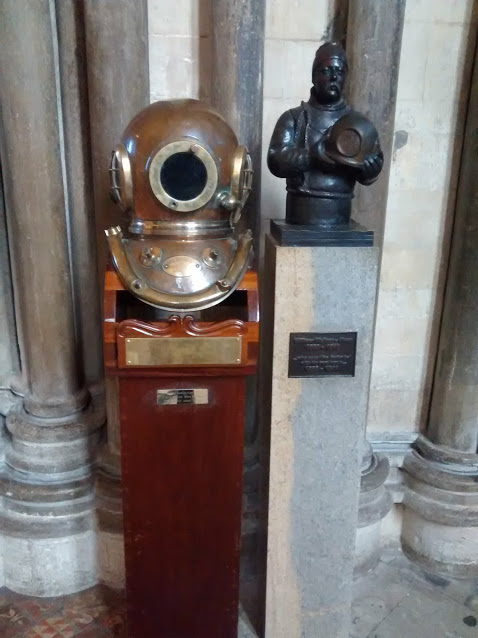
Unless you’ve been to Winchester Cathedral, (and unless you’ve been to a particular corner of Winchester Cathedral), you probably won’t have heard of William Walker. He’s one of my quiet heroes.
In 1905 it was discovered that the retrochoir, the space behind the cathedral’s high altar, added to the original structure in the 13th century and built as a shrine for St. Swithun, was gradually sinking into the earth. (And yes, that saint: ‘St Swithun’s day if thou dost rain/ For forty days it will remain’ – water is truly inescapable in all this). The truth of it is that the entire structure of the cathedral, built on a bed of peat and gravel, is sinking, but for now, it remains relatively stable; the retrochoir, however, was on a comparatively uncompressed layer of peat and was sinking faster than the rest. Architects and archaeologists were called in to assess the situation and came up with an ingenious solution. Essentially, trenches, or drifts, 18-20ft in depth, were cut alongside and beneath the sinking walls and foundations, with the idea that the layer of compressing peat – some four feet thick, and generally encountered at around 16ft – could be pierced, removed and new foundations built upwards from the solid bed of gravel. The main problem was that when the peat was pierced the drift would almost completely fill with water; laying concrete in these conditions was impossible.
Enter one William Walker, an already renowned diver and part of the famous Siebe Gorman Ltd group. Walker’s task was to enter the drift in his 200-pound diving suit, where, working in absolute darkness, he would scrape away the remnants of the layer of peat. The peat was then hoisted to the surface in buckets, and Walker would lay huge bags of concrete on the gravel floor, bags which could be slashed open and left to harden for a 24 hour period. These would seal the hole, the drift could be pumped free of excess water, and more traditional brickies could then enter the hole and complete the laying of new foundations beneath the cathedral.
If that sounds like a huge undertaking, consider that it took Walker, diving almost single-handedly, the best part of five years to complete. Five years of 8-hour days in the darkness, bumping into half revealed coffins (for these were old burial grounds) and wearing a massive encumbrance, the boots alone of which weighed 20 pounds each. And at the end of each working week he’d cycle home – 70 miles to Croydon. If the project was considered a total success, it is of course only a temporary reprieve: the cathedral, built on shifting ground and with an unpredictable water table, will eventually be pulled apart.
In terms of a suitable salute to Walker, this track, recorded by Oli Barrett, performing under his Petrels moniker, is just the thing. It’s from the Haeligewielle album, released in 2011, an album full of tracks broadly related to songs of water, songs of stone, and mostly based in the vaults of Hampshire’s haunted chalk halls. As the drones surge, Walker’s mantra, to hold, to hold, is almost submerged, but not totally. Not just now.
Alone I work, while all around me darkness swirls.
Of sinking stone.
I will not stop until all these walls have found their cause,
To hold.
To hold.

